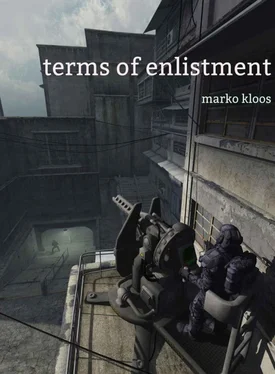“Yes, ma’am,” I say.
Without our afternoon coffee talks, the Medical Center becomes unbearably boring. My only form of decent entertainment, and my link to the world outside, walked out in Major Unwerth’s briefcase. I’ve slept enough to have plenty of sleep stockpiled for a year, and watching the tripe on the Networks got old again after an hour or two, so I spend my time going for increasingly long runs around the Medical Center. I don’t even realize how much I had gotten used to daily runs until now. The hospital-issued footwear is unsuitable for anything faster than a slow walk, so I get out my old civilian shoes, and map out a circuitous route through the miles of corridors in the Medical Center. I run as fast as I can without drawing the ire of the staff, through corridors and hallways, and up and down dozens of staircases. I just have my route perfected, when Corporal Miller comes in one morning just as I am putting on my shoes for another run.
“You do know we have a gym, right?” she says. “It’s on the top floor, right next to the rec room. We use it for light rehab. It has weight machines and everything.”
I was up there once, to see if the rec room was worth my time, and I decided that it wasn’t after seeing the people in there mostly lounging on chairs and watching the Networks on the screens overhead. It’s like the government considers Network access an essential patient need, just like food and medication. It feels disturbingly like being back in the PRC—everything is public property, even the food you eat and the clothes you wear, and everybody just sits around and drools at the Network screen.
“I guess I can stand lifting a few weights again,” I say, and Corporal Miller smiles. I suspect she’s not used to her patients actually wanting to work out again.
“Looks like you’re about back to normal,” she says. “Maybe the doc’s going to release you a bit sooner than we thought. How would you feel about that?”
“I’d probably kiss the doctor on the mouth,” I say. “Regardless of age. Or gender.”
Corporal Miller laughs.
“Well, let me see what I can do. You seem to be bored to tears in here, and if you can spend three hours a day running around the place dodging meal carts, you’re probably ready to go back to your unit.”
A few hours later, the door of my room opens, and one of the doctors comes in. I don’t have a particular doctor assigned—they all work in shifts, and I’ve seen half a dozen different ones since I got here. They all wear Class B uniform shirts under their medical smocks, they all have captain’s bars on one collar and the Medical Corps device on the other, and they all talk in the same detached, semi-interested manner.
“I’d say your nurse assessed you correctly,” he says as he walks in. I have been pumping out a set of push-ups, with my feet on the bed and my body at a slight downward angle. Before I joined the military, I could barely complete twenty regular push-ups. Now I can do three sets of thirty while my legs are up on a bed or window sill, the result of doing hundreds of push-ups a day back in the TA.
“Yes, sir,” I reply as I finish my push-up and jump to my feet in a deliberately light-footed manner.
“You’re not asking what she’s right about,” the doctor smiles.
“Doesn’t matter,” I smile back. “Corporal Miller is right by default.”
“Good attitude,” he says. His name is stenciled onto the breast pocket of his white smock: DR MORELLI.
“So are you going to let me out early?”
“Do you want to be let out early? With your kinds of injuries, you can get by with claiming a few more weeks of downtime.”
“I’ve had about all the downtime I can stand,” I reply. “I’m ready to move on.”
Doctor Morelli consults the clipboard he carries, and shrugs.
“Well, your abdominal fusing worked like a charm, and you’re good as new, medically speaking. Your lungs are back to normal, too, but I guess you’ve already figured that out, since you’ve been breaking the speed limit on every floor in this place.”
He flips through the printouts on his clipboard, and then scribbles something with his pen.
“I’m releasing you back to active duty as of tomorrow morning. If you feel that you require follow-up care after all when you’re back in your unit, you are to report to your designated medical facility on-base. Other than that, I’m marking you as fit for unrestricted duty.”
It’s amazing what modern medicine can do. Two weeks ago, I was shot through my lung and lower intestines, and now I am once again fit for unrestricted duty. Back home in the PRC, anything worse than a headache meant having to go over to the Public Clinic, where you have to wait just about all day just to see a doctor’s assistant, and where any injury more serious than a hangnail means you’ll be in misery for a few weeks because the diluted prescriptions don’t do much for the pain. I still live in government housing, I still eat government food, but my new status as a soldier makes me more worthy of being kept in running condition.
I don’t voice all those thoughts to Doctor Morelli, of course. Instead, I just nod, and try not to look too relieved about being let out of this place.
“Thank you, Doctor,” I say. “I really appreciate it.”
“Not a problem,” he replies, and I can tell that he’s not used to being thanked for active duty releases. There’s no combat here, and the risk of dying is much lower in a hospital rec room than on a spaceship or in an infantry battalion, but all things considered, I’d rather die from small arms fire than boredom.
Being a Navy trainee is like being a student in an exclusive private college where the students happen to dress in dark blue uniforms. There are no stern drill instructors like Sergeant Burke, and nobody ever raises their voice at us. Our instructors are Navy officers dressed in immaculately starched khaki shirts and slacks.
We live in dorms, with separate rooms for every trainee, and my first night in Navy training is the first night since PRC Northshore-7 I have spent in a room all by myself. The Navy training companies are all quartered in giant buildings named like ships- Enterprise, Intrepid, Iroquois -and while the buildings are old, the interior of our particular “ship” is new and spotless. The furniture in my room is made of wood-grained polymer, and it looks like nobody has used it before me. There’s a brand new PDP on my desk when I move into my room, the shelves on the wall are lined with reference materials printed on real paper, and my room even has a private bathroom, complete with shower stall.
Navy Indoc training takes five weeks, and nearly all that time is spent in air-conditioned classrooms. There are physical exercise sessions every day, but most of them are ball games between different training platoons or companies, and none of the PT sessions involve running up and down the roads of the Naval Station. Our instructors explain to us that outside runs are restricted because of the abysmal air quality so close to the Chicago metroplex, so we just kick and throw balls to each other in the gym of our “ship”.
The first week in training, I suffer a bit of a culture shock from my transition. In Basic, I followed the policy of always running with the crowd, and never sticking out. Here in Navy Indoc, I stick out no matter what I do. My responses to instructor orders are too loud, my salutes are too sharp, and my PT scores are too good. The creases in my uniform are too precise, my shoes too spotless, and my classroom answers too prompt. Not a week into Indoc, the entire training company seems to know that I’m a transfer from the TA.
Читать дальше












